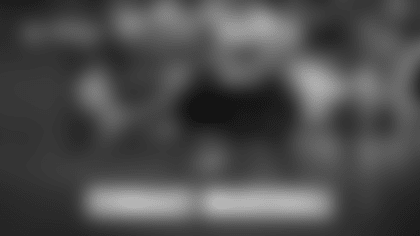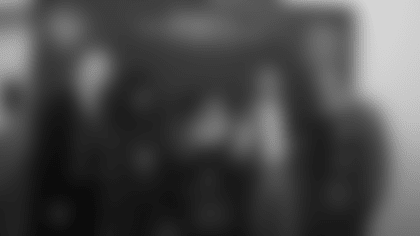The Eagles continue to support nonprofits that work to reduce barriers to opportunity and end racism. In support of Black History Month, the Eagles are proud to recognize the work of one of these nonprofits each day.
Jenny Bogoni, the executive director of the Read by 4th campaign through the Free Library of Philadelphia, drops a bombshell that shines a light on a calamity that is taking place in our schools.
Only 39 percent of all Philadelphia schoolchildren can read at grade level entering fourth grade.
You read that correctly. Nearly two-thirds of schoolchildren in this city are left behind.
Why is fourth grade a critical milestone? According to Bogoni, schools transition to reading comprehension instead of the fundamentals at this stage, meaning that if students cannot understand what they're reading, it'll spill over to other subjects. A student won't make sense of a written math problem or figure out the science lesson.
That number should be seared into our minds – only 39 percent.
And that's pre-COVID. Who knows where that number lies now?
"The urgency just seems like it's greater," says Bogoni, who attacks the problem as a mother and an advocate for Philadelphia. "If we don't fix education and get children in the city the education that they deserve, then we're not going to have a city we all want."
Bogoni adds that if students don't make the fourth-grade benchmark, they are four to six times less likely to graduate high school on time. Reading is the key that unlocks other possibilities and avenues for children.
The good news is that Read by 4th has a roadmap for success, a game plan.
First, it starts at home. Parents need to engage with their kids, especially in the first three years of life, when studies show that the brain is most elastic and open to knowledge. This is accomplished by talking, singing, playing, and, yes, reading to children. Once in school, it's continuing to set the right example when teachers aren't around – in the summertime. It's like any other skill. It must be practiced. If a child doesn't touch a book from the end of one school year to the start of the next, there will be a regression. There's even a term – the summer slide, Bogoni says – and this one isn't fun.
"A family's love for their children is probably the most underutilized resource we have in our community. And if we could just leverage that love and turn it into action, right action, we can change the world," Bogoni says.
Next, it's providing books where people are in the community, whether it's stores, barbershops, or laundromats. Children shouldn't need to go to a library to find a book. Increase access.
Third, it's working with schools to more effectively understand reading levels and better prepare teachers to develop readers. There is a philosophical divide going on right now. Scientific research has cultivated new teaching methods to accomplish this mission, but it's different than what's taught in most colleges. New teachers are coming out with degrees, but not necessarily armed with the best methods to reach students. It is the children who suffer as a result.
It's going to take a team effort to reverse the trend. Read by 4th works with hundreds of organizations throughout Philadelphia with the vision to make literacy a reality for schoolchildren.
Learn more about Read by 4th:
• Website















